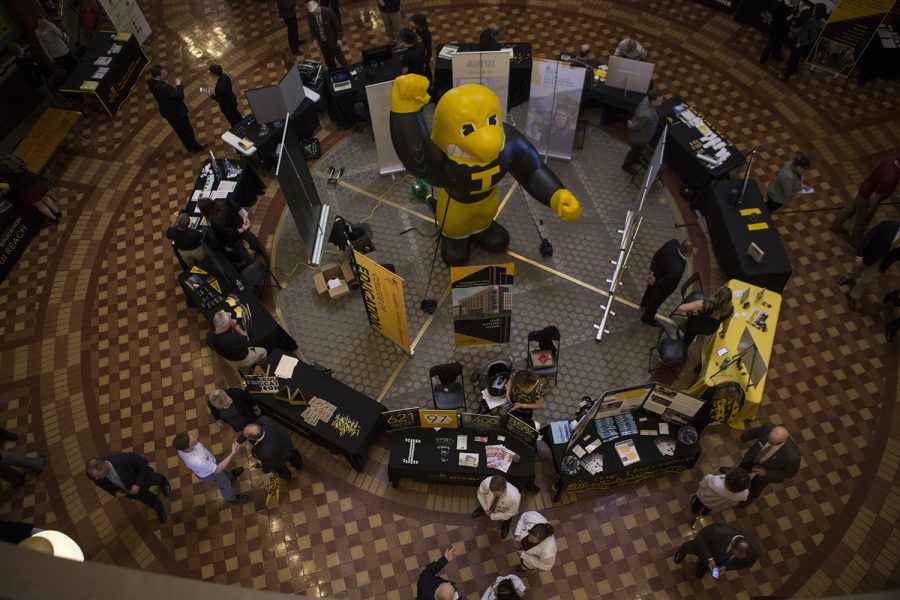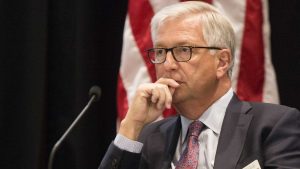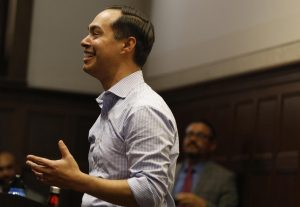Students advocate for state funding, UI support during Hawkeye Caucus
In the Hawkeye Caucus trip on Tuesday, students spoke to Iowa legislators about promoting increased education funding, medical amnesty, and more transparency for renters.
An inflatable Herky sits on the ground floor of the state Capitol during Hawkeye Caucus in Des Moines on April 9, 2019. The Hawkeye Caucus provides members of the UI community to come speak with Iowa legislators.
April 9, 2019
Hawkeyes flooded the state Capitol on Tuesday to advocate for a variety of issues important to the University of Iowa and its students.
Those who took part in the annual Hawkeye Caucus conducted one-on-one meetings with state legislators to discuss a number of issues facing students, ranging from state funding to medical amnesty.
UI Student Government Governmental Relations Director Connor Wooff emphasized the importance of using this annual event to make personal connections with lawmakers.
“A lot of government relations is relationship building and making sure that legislators know who we are,” Wooff said. “We’re able to talk to them about student concerns.”
About 70 students took part in the event, Hawkeye Caucus President Ellie Paxson said.
“We have a really good presence at the Capitol today. We’re excited about it,” she said.
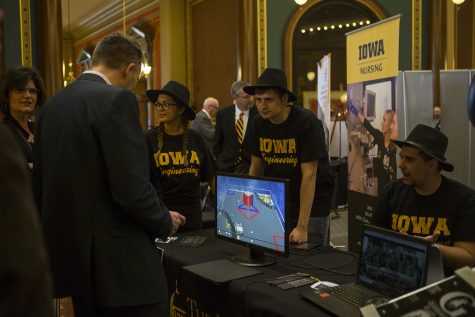
Members of the College of Engineering display a robot driving simulator during Hawkeye Caucus at the state Capitol in Des Moines on April 9, 2019. Hawkeye Caucus provides members of the UI community to come speak with Iowa legislators.
A major point students advocated for on Tuesday was increased funding for the state Board of Regents’ universities.
RELATED: Iowa House passes education budget falling short of funding requests
The Iowa House passed an appropriations bill providing for a $15.9 million increase to the state Board of Regents on April 4. The appropriation is an increase from last year but still falls short of the regents’ $18 million-increase request.
“Appropriations are critical,” UISG President Hira Mustafa said. “We see budget cut after budget cut every year… That’s critical, because no matter what our priorities are, we can’t do any of them without funding from the state.”
Students also advocated for a medical-amnesty bill, which would allow minors who are intoxicated to seek medical attention during an emergency without fear of penalty.
UISG Vice President Heath Schintler said that, while medical-amnesty systems are in place on campus, the state has no such protections.
“As soon as you leave campus, there are no longer legal protections for students,” Schintler said. “We know that that’s a barrier for them to call for emergency assistance, and at the end of the day, we want to prioritize student health and safety.”
RELATED: UISG-backed medical-amnesty bill advances in Iowa Legislature
Mustafa said UISG has been advocating for medical amnesty for a number of years, and it currently has bipartisan support.
The Iowa House Public Safety Committee passed medical-amnesty legislation March 6, while its companion bill in the Senate was placed on unfinished business on April 4.
Increasing transparency between landlords and tenants was another important point of discussion, UISG City Liaison Gustave Stewart said.
After conducting a survey in relation to the UISG renter’s guide, Stewart found 23 percent of students had not received their deposits back after their lease ended.
“I would like to believe the landlords are being fair in that measure,” Stewart said. “But 23 percent is high.”
To prevent students from experiencing unfair rental practices, Hawkeye Caucus members advocated creating a move-in checklist, something Stewart said is in place in 14 other states.
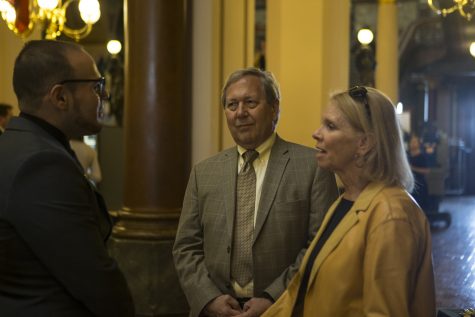
UI President Bruce Harreld and his wife, Mary Gillian Harreld, are seen at Hawkeye Caucus in the state Capitol in Des Moines on April 9, 2019. Hawkeye Caucus provides members of the UI community speak with Iowa legislators.
A checklist would help tenants document conditions when they move in so landlords can point to specific issues that would warrant the loss of a deposit, Stewart said.
In addition to student policy advocates, representatives from various departments and colleges in the university set up booths to speak with lawmakers and highlight developments.
UI President Bruce Harreld said that despite his frustrations about years of decreased state funding, he valued the more than $200 million dollars the state gives in support every year, and said the program was a way to show thanks to state lawmakers.
“We’re here showcasing all the great work that we do at campus all year long,” Harreld said. “Every college, almost every department is represented here one way or the other.”



